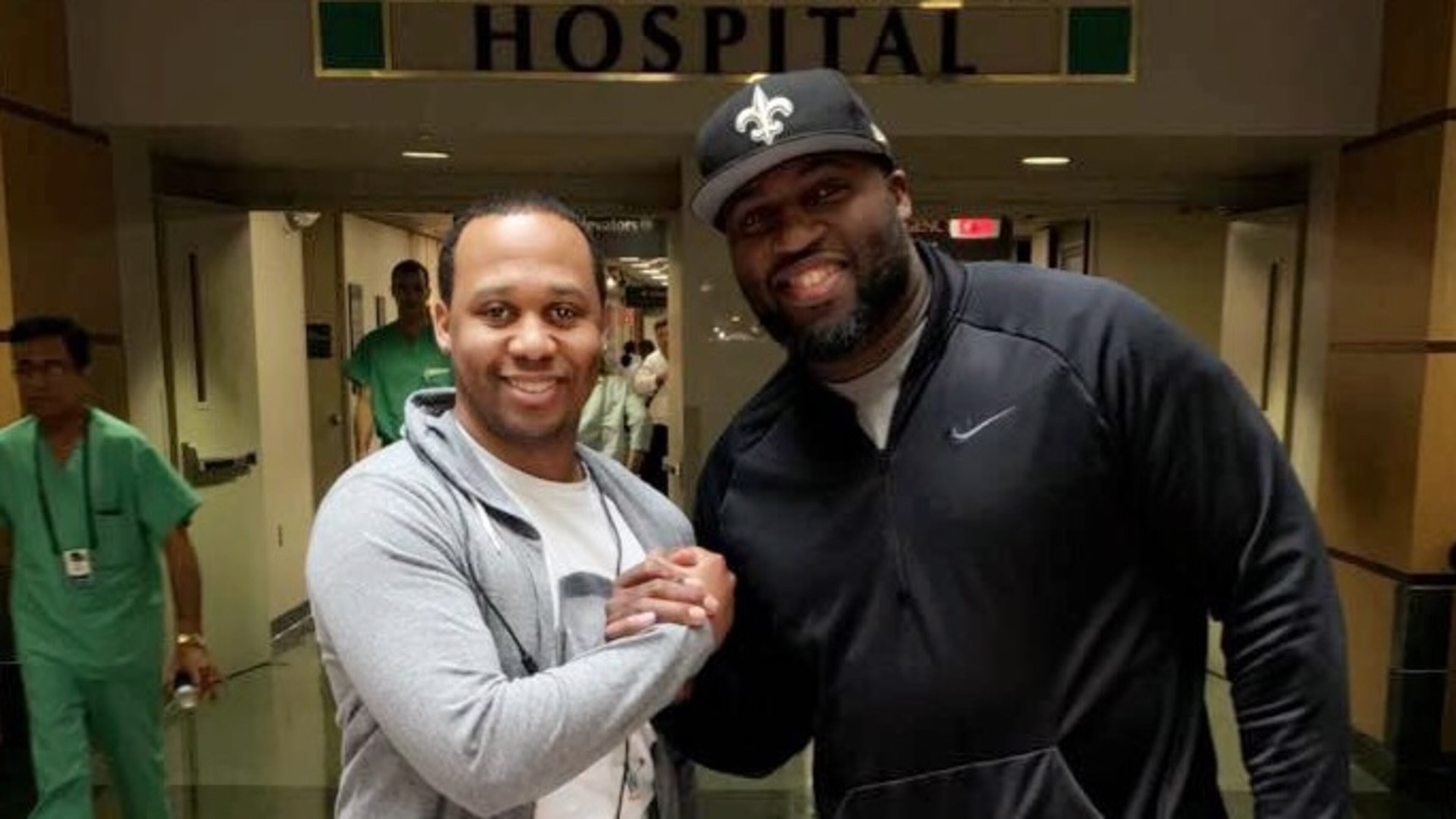Tech great Greg Gathers has found a kidney donor

Chris Wallace called up Greg Gathers last summer, unsure of what he would tell his childhood friend. Wallace had already told Gathers, the Georgia Tech football great suffering from a failing kidney, that he wanted to donate his kidney if they were a match.
Gathers responded by telling him to take some time to make sure of his decision, wary that his last transplant surgery resulted in his donor (his mother) suffering from internal bleeding. Wallace was still on the fence when he dialed him back a few days later. That’s when Wallace said he heard Gathers’ children in the background wanting him to play with them. However, Wallace said, Gathers was too weak, having just returned from one of his thrice-weekly dialysis treatments. In that moment, Wallace, a nurse and single dad from LaPlace, La., said that all uncertainty evaporated
“I gotta do it. I have to do it,” Wallace said he thought to himself. “Guy doesn’t even have the energy to play with his kids.”
Monday morning at Ochsner Medical Center in New Orleans, Wallace will give his friend the opportunity to play with his four children and to live a life without complications when he will have one of his healthy kidneys transplanted into Gathers.
“I’m just very fortunate, where this gives me a chance to prolong my life,” Gathers said. “My chance of moving on and living a productive life is even greater than being on dialysis. He’s basically saving my life.”
If the procedure goes as planned, Gathers, 35, will be able to enjoy life free of health issues for the first time since the summer after he was named an All-American defensive end in 2001. It was then that a failing kidney began to cause complications. He was ultimately diagnosed with focal glomerulosclerosis, a kidney disease that can be fatal without dialysis or a kidney transplant.
The condition brought Gathers’ career, in which he became Tech’s all-time sack leader (a record held until Jeremiah Attaochu broke it in 2013), to an end. He began dialysis in 2004 and underwent transplant surgery in 2005 when his mother Janice donated one of her kidneys.
However, a complication during the surgery delayed the transplant and damaged the kidney to the point that he was told that he could probably only use it for a year to three years, Gathers said. He has made it almost 12 years. By last summer, though, he had reached the point where his kidney was failing. He either needed a transplant or would have to remain on dialysis, which require three treatments weekly of 4 ½ hours each, a draining commitment that was constraining his life as a father, husband and middle-school teacher and high-school football coach in Gonzales, La., about 20 miles south of Baton Rouge and 30 miles northwest of his hometown of LaPlace.
Wallace, 35, learned of Gathers’ condition as friends and family spread word of his dire condition through social media. The two had been friends from the time they were 11, Wallace said, growing up in the same neighborhood in LaPlace, about 25 miles west of New Orleans. He was a blood-type match (O-positive). He thought he wanted to be a donor.
“I had a moment where I prayed and I asked God that, if it’s meant for me to do this, then everything will fall into line,” Wallace said, “and this is where we’re at now.”
After Wallace’s decision – prompted by his overhearing Wallace’s children on the phone – he had to go through multiple bloodwork tests, physical examinations and psychological testing.
“They want to make sure just because I’m doing this, there won’t be lasting effects for me, that my body will be able to do this,” Wallace said.
Wallace got a phone call just before Thanksgiving telling him that he was a match for his friend. They had hoped to schedule the procedure before Christmas, but February 20 proved to be the best date. The procedure is expected to take around four hours. Wallace ought to be released within two or three days and Gathers within four. They planned to drive together to the hospital.
“A robot is doing the surgery, which is pretty cool,” Wallace said.
Doctors have told Wallace that he should feel no effects of the surgery within three months. Wallace said he’s eager to get the operation over with so he can get back to his routine.
“At the end of the day, I just felt this was something I should do,” Wallace said. “This is my way of putting something good out there, because there’s so many negative things out there in the world today. You need a feel-good story.”
Gathers looks forward to being more involved in his children’s lives with wife Danaya. Recently, for instance, he had to miss his nine-year-old daughter Aiyannah’s dance competition in Biloxi, Miss., because of his dialysis treatment. Professionally, he may go back to high-school coaching, which he had to give up this past season. He’s also considering trying to become a principal (he has a master’s in educational leadership) or moving to Dallas, where his brother Rico just finished his first NFL season, to manage his business affairs.
He also has plans for his daughter to get together for play dates with Wallace’s daughter, Calen, who is eight. It’s only natural.
“He has a brother in me now through this,” Gathers said of Wallace. “I’m thankful that this situation brought us back together.”


